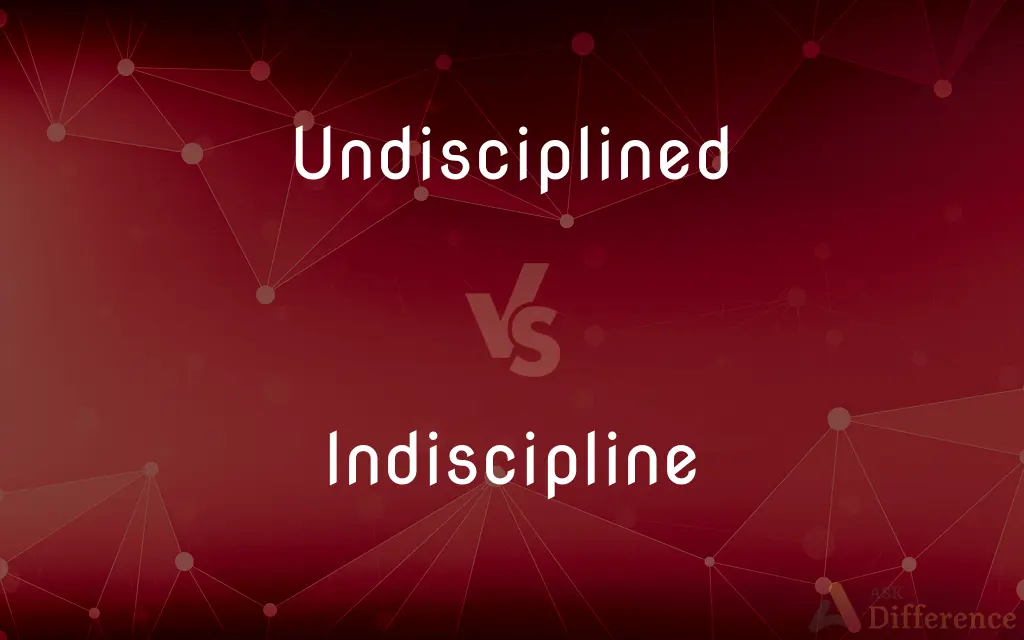Undisciplined vs. Indiscipline — What's the Difference?
By Tayyaba Rehman & Urooj Arif — Updated on March 17, 2024
Undisciplined describes a lack of discipline in behavior or manner, while indiscipline refers to instances or the state of disorder due to non-compliance with rules.

Difference Between Undisciplined and Indiscipline
Table of Contents
ADVERTISEMENT
Key Differences
Undisciplined is an adjective describing someone or something exhibiting a lack of discipline, control, or restraint, often leading to chaotic or unstructured behavior. Indiscipline, on the other hand, is a noun that denotes the state or condition resulting from a lack of discipline, such as disorderliness or non-compliance within a group.
While an undisciplined individual may struggle with self-control, procrastination, or adhering to personal or professional standards, indiscipline often manifests in collective settings, such as in schools, workplaces, or military units, indicating widespread non-adherence to rules or expected behaviors.
The term undisciplined often implies personal responsibility for the lack of restraint or self-control, suggesting an area for personal growth or improvement. Conversely, indiscipline can suggest systemic issues within organizations or groups, requiring leadership or structural changes to address the underlying causes.
Addressing undisciplined behavior typically involves self-reflection, setting personal goals, and developing habits that encourage discipline. Addressing indiscipline, however, may require policy reforms, leadership intervention, and collective efforts to establish and maintain order.
Undisciplined behavior can have direct consequences on an individual’s productivity, health, or relationships, reflecting personal challenges. Indiscipline, by affecting group dynamics and efficiency, has broader implications, potentially undermining the success and harmony of organizations or communities.
ADVERTISEMENT
Comparison Chart
Definition
Lacking personal discipline or control.
The state or condition of being disorderly due to rule non-compliance.
Nature
Adjective describing personal traits.
Noun describing a collective state or condition.
Manifestation
In individual behavior or manner.
In group settings or organizational environments.
Implication
Suggests personal responsibility for lack of restraint.
Indicates systemic or collective issues requiring intervention.
Approach to Address
Self-reflection, personal goal setting, habit development.
Policy reforms, leadership intervention, collective efforts.
Consequences
Affects individual productivity, health, relationships.
Affects group dynamics, organizational success, and harmony.
Compare with Definitions
Undisciplined
Exhibiting poor self-restraint or discipline.
The undisciplined student struggled to complete assignments on time.
Indiscipline
State of chaos in a collective due to rule non-compliance.
Indiscipline in the team led to project failure.
Undisciplined
Tendency to delay tasks and responsibilities.
Her undisciplined habits led to last-minute study sessions.
Indiscipline
Need for authority to restore order.
The principal addressed the indiscipline with new rules.
Undisciplined
Demonstrating disobedience or a lack of manners.
Undisciplined children often disrupt classroom activities.
Indiscipline
Organizational problems leading to widespread disorder.
Indiscipline in the school was linked to inadequate policies.
Undisciplined
Inefficient use of time due to lack of discipline.
Undisciplined time management affected his project performance.
Indiscipline
Failure to adhere to established norms or guidelines.
Indiscipline among employees resulted in safety violations.
Undisciplined
Not subjected to discipline, control or correction; uncorrected
Indiscipline
Requires group actions to establish discipline.
Addressing indiscipline in the workplace required team workshops.
Undisciplined
Lacking in self-control; ungovernable
Indiscipline
Lack of discipline or restraint.
Undisciplined
Not subjected to discipline;
Undisciplined talent
Indiscipline
Lack of discipline.
Undisciplined
Not subjected to correction or discipline;
Let her children grow up uncorrected
Indiscipline
Lack of discipline or instruction.
Undisciplined
Lacking in discipline or control;
Undisciplined behavior
Ungoverned youth
Indiscipline
The trait of lacking discipline
Common Curiosities
Can indiscipline affect a single person?
While indiscipline typically refers to group settings, individual actions contributing to broader disorder can be a factor.
What causes indiscipline in organizations?
Causes include systemic issues, inadequate leadership, and failure to adhere to established norms or guidelines.
What is indiscipline?
Indiscipline is the state or condition of disorderliness due to non-compliance with rules or lack of discipline.
What are the consequences of indiscipline in the workplace?
It can lead to decreased productivity, safety issues, and a negative organizational culture.
What role does leadership play in addressing indiscipline?
Leadership is crucial for setting expectations, enforcing rules, and modeling disciplined behavior.
How can one overcome being undisciplined?
Through self-reflection, setting personal goals, and developing disciplined habits.
Is undisciplined behavior always negative?
While often seen as negative, some aspects of being undisciplined, like creativity or spontaneity, can have positive effects.
What does it mean to be undisciplined?
Being undisciplined refers to a lack of self-control or discipline in one’s behavior or actions.
How can undisciplined behavior affect an individual?
It can lead to poor productivity, health issues, and strained relationships due to lack of self-restraint and organization.
How does indiscipline affect educational institutions?
It can lead to a disruptive learning environment, affecting academic performance and student behavior.
What measures can organizations take to combat indiscipline?
Implementing policy reforms, effective leadership interventions, and fostering a culture of accountability.
Can indiscipline be a sign of larger issues within a group?
Yes, it often indicates broader systemic problems or dissatisfaction among members.
How does society view undisciplined individuals?
Society may view them as irresponsible or unreliable, impacting social and professional relationships.
Can a disciplined person become undisciplined?
Yes, changes in environment, stress, or lack of motivation can lead to a decline in discipline.
Is addressing indiscipline solely the responsibility of leaders?
While leadership is key, it requires a collective effort from all members to effectively address and resolve.
Share Your Discovery

Previous Comparison
Description vs. Specification
Next Comparison
Enchilada vs. ChimichangaAuthor Spotlight
Written by
Tayyaba RehmanTayyaba Rehman is a distinguished writer, currently serving as a primary contributor to askdifference.com. As a researcher in semantics and etymology, Tayyaba's passion for the complexity of languages and their distinctions has found a perfect home on the platform. Tayyaba delves into the intricacies of language, distinguishing between commonly confused words and phrases, thereby providing clarity for readers worldwide.
Co-written by
Urooj ArifUrooj is a skilled content writer at Ask Difference, known for her exceptional ability to simplify complex topics into engaging and informative content. With a passion for research and a flair for clear, concise writing, she consistently delivers articles that resonate with our diverse audience.














































